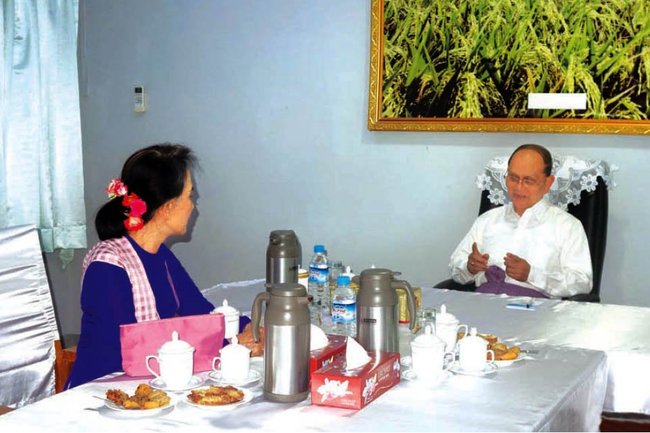Burma’s President Thein Sein met with opposition leader Aung San Suu Kyi in Naypyidaw on Monday to discuss constitutional reform and steps to ensure free and fair elections later this year, according to the Information Minister Ye Htut.
The meeting in the Burmese capital comes at a time when various flashpoints across the country, such as the ongoing Kokang conflict and students’ protests, have brought the government under the spotlight.
Asked to speculate on the behind-closed-door dialogue taking place on Monday evening, political analyst Yan Myo Thein said, “I assume the meeting was necessitated by the political pressure the government has faced recently through domestic issues such as the growing student protests against the National Education Law.
“One of the issues on the agenda is to discuss charter reforms,” he said. “It has been over 700 days since efforts to amend the Constitution were initiated. However, to date there is yet to be an amendment bill tabled in parliament. I view this as a pretty ugly political scenario and I expect Daw Aung San Suu Kyi to stress this matter to the president.
Pho Thaukkyar, a veteran Burmese journalist, told DVB that “bringing about peace and ensuring free and fair elections are the utmost wishes of the people. I wonder what is keeping the government from being open about these issues. Daw Aung San Suu Kyi’s silence on this matter also baffles me. I find it not very reassuring.”
One item sure to have been high on Suu Kyi’s agenda would have been a proposed referendum to amend Burma’s Constitution ahead of the general election which is slated for November.
Her National League for Democracy (NLD) party campaigned vigourously across the country throughout 2014, calling for public support in its bid to overturn provisions in the Constitution that it says enshrines the military’s hold on power.
Article 436 of the current charter allows the military MPs in parliament an effective veto over reform, the NLD says, on the basis that all amendments require the approval of 75 percent of each house. The military retains 25 percent of all seats in parliament as per the current Constitution, drawn up under military junta guidelines in 2008.
[related]
The NLD has also been a vocal critic of constitutional Article 59(f), which effectively bars Suu Kyi from becoming president because her late husband was foreign and her children have foreign citizenship. It also contains a provision that a presidential nominee has military experience.
Plans to discuss charter reform through a round of quadripartite or sexpartite talks were scuttled in January when Thein Sein rejected the proposal on the grounds that such dialogue would be unconstitutional and a breach of rule of law.
However, parliamentary house speaker Shwe Mann weighed in on the issue, urging the president to reconsider.
Shwe Mann, who is frequently at odds with military hardliners but widely seen as a frontrunner in the race for the presidency, said that initiating such dialogue will “bring about positive outcomes for the country’s tranquillity, development, ethnic unity, national reconciliation, peace, and democratic transition.”
Monday’s was the sixth face-to-face meeting between the president and Suu Kyi since Thein Sein came to power in March 2011.
They first met in August 2011 as the new government’s policy of economic and political reform was taking hold, a process which encouraged The Lady to join the political fray. The NLD subsequently competed in by-elections in April 2012, with Suu Kyi sweeping the polls in the constituency of Kawhmu, giving her a seat in the lower house. She met with Thein Sein on 11 April in the wake of her victory.
The pair met again on 31 Aug 2013 for what was termed a “friendly chat”. According to Information Minister Ye Htut: “They exchanged points of view on the country’s affairs.”
Then on 31 October 2014 the two met once more, ahead of US President Barack Obama’s second official visit to Burma. They were joined by other politicians and Commander-in-Chief Snr-Gen Min Aung Hlaing in Naypyidaw when the reform process and a proposal for quadripartite dialogue was on the agenda.
Following that, Thein Sein hosted opposition leaders, ministers for ethnic affairs, ethnic representatives, parliamentary speakers, military leaders and Suu Kyi for talks at the presidential palace in Naypyidaw on 12 January.
However, Suu Kyi expressed her disappointment at the lack of progress and at the format of the talks. “This meeting will not make up for the [proposed] sexpartite dialogue,” she later remarked.
On Sunday, in his monthly radio address to the nation, President Thein Sein confirmed that the general election will be held in November.



